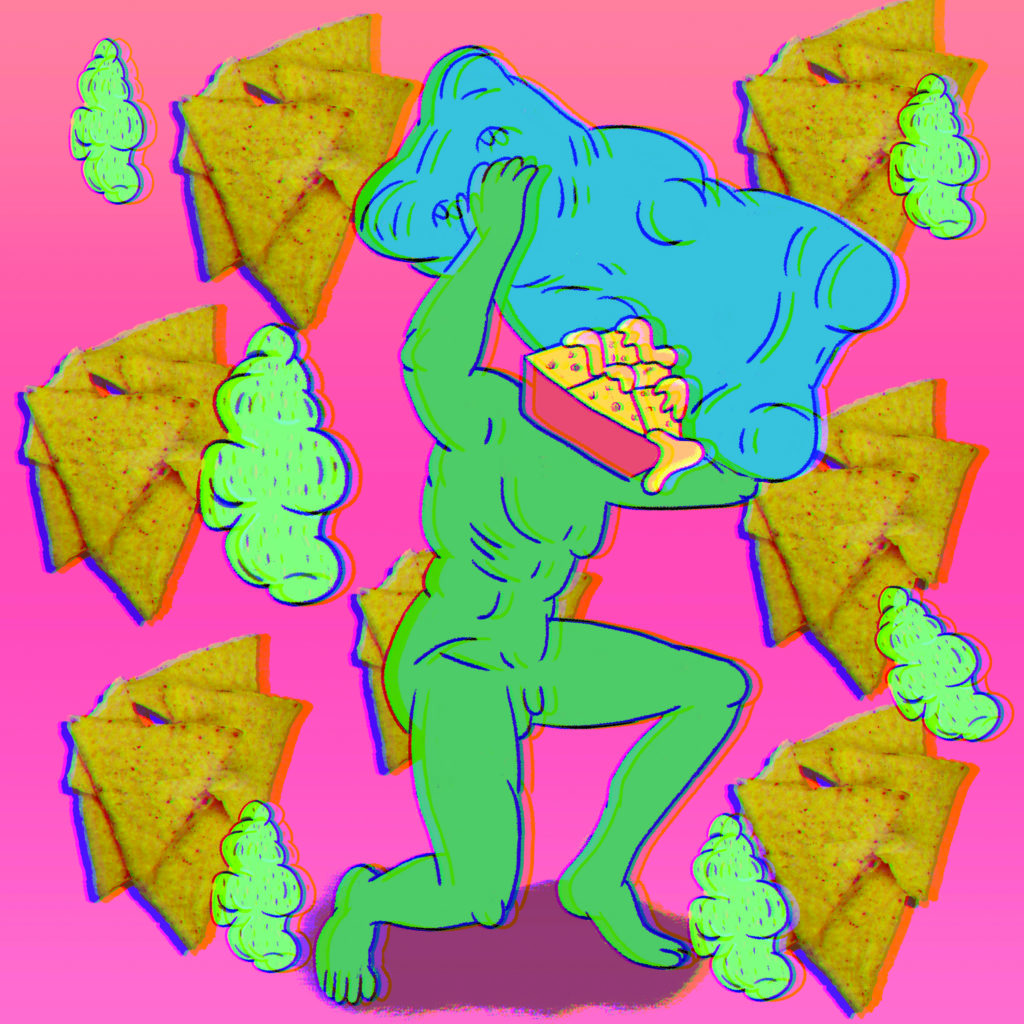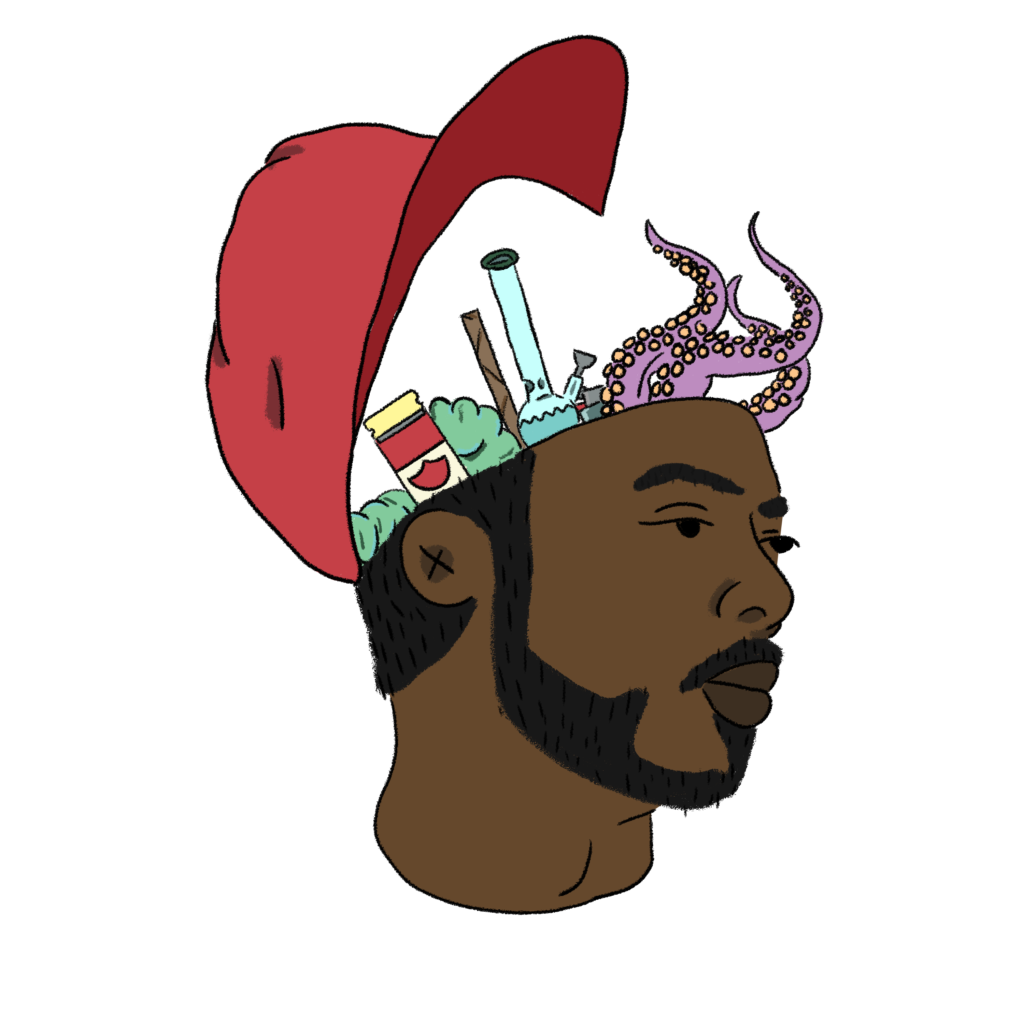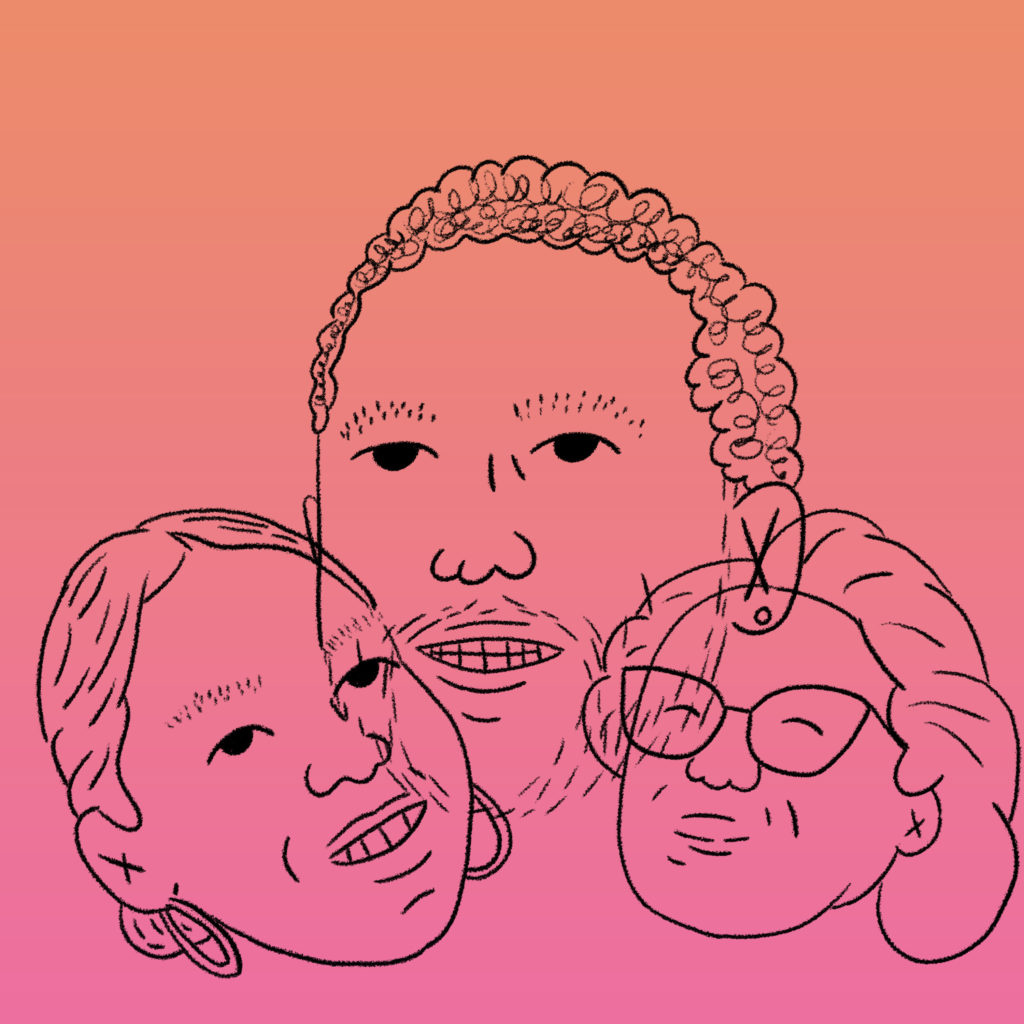The first thing that you notice are the murals commemorating familiar names and styles in Los Angeles graffiti. There’s a lowrider piece, some wiseguy B-boy characters with Kangols and Adidas Gazelles, and an almost living, breathing painting of a woman of color that I affectionately call “the homegirl.”
The staff are multicultural, educated, and helpful, but take a no-nonsense customer service approach. It’s one that can only be one-upped by the 70-something Korean couple at the pro club shop at the Slauson Supermall (you know which couple I’m talking about). All this place needs is a skatepark and a pizza shop, and I’d swear it was old Venice.
Instead, I’m downtown on Flower Street, right around the corner from the Los Angeles Convention Center, where you can find a special mom-and-pop business — a jewel of a cannabis dispensary. Welcome to LitCo.
Why is this place special? How can a dispensary be special? MedMen looks like a fucking Apple Store. Cookies is a high-end streetwear shop for SoundCloud rappers and Instagram models. And let’s be real, you can stay at home and order all the dope you need in 2020.

I’m here for two reasons. The first is to do this interview and the second is the only other reason I’m ever in any weed shop: to pick up pre-rolls for my girlfriend. I walk in and am immediately greeted by my old jefe, Zachary Selvin, the current owner of LitCo, who organized an outdoor grow-op that we worked on in Mendocino nearly two decades ago. Zack is half-Black and half-Jewish — like Drake — but that’s where the similarities with Aubrey end. He’s a small dog with a huge presence, an American bully pit that would die before he backed down. We immediately get all nostalgic and woozy. I feel a flashback coming on.
It’s the early fall of 2004. You can catch me on the I-5 northbound from Los Angeles, in the back of what I can only describe as a rock-bottom hippie divorcee wagon. I’m on my way to an enchanted, distant, and foreign land affectionately known as the Emerald Triangle. The route between L.A. and the Bay is a strip of land that I’ve traversed a hundred times with family, friends, absolute strangers, and even the opps once. But on this occasion, I’m with a ragtag bunch of scene acquaintances and relative strangers in a modified van being driven by a guy in a sleeveless leather vest. This is the first time I heard someone’s crusty ass lips drip the words “BURNING MAN.”
Flash forward to a few hours north of the Bay Area (I thought Oregon was a lot closer lol). I’m asleep in the back of the van and am abruptly woken by a fire and everyone screaming and running out of the van. In between one of the seats, there was a chest with a fire extinguisher inside. I leaped out of the soon-to-be inferno, stepping on someone’s hand who was attempting to grab the chest to put out the fire. My bad. The flames were soon doused and we discovered the cause of the fire: Mr. Sleeveless Leather Vest Guy was driving with the emergency brake on for hours at full speed. Ironically, I almost became a burning man right after discovering it. FUCK BURNING MAN.
I was the youngest and least knowledgeable about what was to come. All that I really knew was what my friend had told me: Come up here and work with me for three months and you’ll make $10,000. Food and other expenses like cigarettes, socks, and green Tabasco-flavored Slim Jim’s are covered. You’ll have to live in a tent and there’s no cell reception. But I was a young dad/server/underground rapper underwater financially; it was a no-brainer. Before this, I’d never had more than $800 at one time (and I found that money). Plus, I loved nature. The more I reflect on those days, I’d do that now just to get away from my phone, get more in touch with nature, and come back with a little money saved.

So there I am, a few months later, in a California that I never knew existed. The urban areas in Southern and Northern California are as diverse as a pack of Haribo gummy bears. But this place was like a bag of only pineapple-flavored gummies. The town’s center was a Walmart, but there were more Mercedes and Range Rovers than any of the other similarly sized rural towns I’ve been to. There were also more Subaru station wagons than I’ve ever seen, which I later discovered was this region’s iteration of a D-boy car. I fell in love.
Our crew consisted of four Black men, two Black women, one white woman, and one white man As far as temporary staff, we’d hire local hippies who trimmed the buds while hopping around from operation to operation carrying gossip, music, and things that you’d need antibiotics for.
From the hippie gossip, I learned that we were an anomaly in the Emerald Triangle: a Black-run grow operation. And though we did everything legal and all had no violent criminal records, we were branded as L.A. gangsters, which none of us actually were. We later discovered that our reputation came from a white woman in her early 20s, who stole a pound from us and was immediately fired. So as to not get the reputation of a thief in this very insular community, she made us out to be monsters. These lies eventually led a state trooper (who we’d nicknamed Chuck Norris) to jump out of a helicopter, threaten to shoot us and our dog, and check our paperwork. When he found out that we had fewer than 1,000 plants, he decided not to rip up our crop because he said it wouldn’t make him “front page in the local newspaper.”
Growing while Black led to us being harassed and sabotaged and even having our water supply violated by a jealous neighbor we called Pigfoot, who knew that the law would never be on our side. I’d constantly ask myself: Why aren’t there any other people up here who look like me? After all, we all consume this product, I know Black people who sell this product, and face ridiculous ass penalties for this product. I was baffled as to why we were an anomaly.

It was only from the mouth of a dreadlocked Israeli soldier girl and a DVD about the life of cannabis activist Jack “The Emperor of Hemp” Herer, where I learned the deeper history of marijuana and racism. It’s common knowledge now, but back then it sounded like a plain old conspiracy theory to me. Ultimately, I realized that it benefited the prison-industrial complex to throw Black boys behind bars for a little weed, which led to the rest of our lives spiraling out of control and making it increasingly more likely that we’d eventually return to prison.
You probably already know that the stop and arrest rate is so much higher for us when compared to our white counterparts. But there we were in an all-white corner of the state that had been known to most of the world for decades for sending forth white boys and girls of all classes to carry large amounts of weed to every nook and cranny in the country.
Boom, here we are back in the now. Modern-day California with its rich history of trailblazing and forward-thinking in regards to science, art, industry, and mind-altering substances. Weed is finally legal; you can have a pound in the trunk and the cops have to treat it as if it were a carton of cigarettes. Being genuinely proud and happy for my friend Zack, I would have assumed that it’s a great time to be a veteran in the weed game.
Zack divulged his run-ins with the Feds, getting ripped off, and the law being on the side of the thieves. Zack said, “They tried to bleed me, dog.”
We discussed his dealings with corporate interests that bought a portion of his company under the guise of helping to navigate in the current cannabis world, and how they used that leverage in an attempt to sink the business and starve him.
By starve, I mean make it so there was no way he could make money to feed his family and pay his rent legally. Their goal was to force him to sell, bit-by-bit, more and more of the company out of desperation. But he valiantly fought the foreign invaders at the cost of his momentary happiness, sanity, and most of the material possessions he’d worked and risked for.
I asked him how it felt to get his company back. He said, “It felt real good.” I could sense him bullshitting me so I said, “My nigga, be honest.”” He opened up a bit more. “It was real emotional, dog. It felt good but at the same time, it was also overwhelming because once I won that battle a whole new battle started. This place was so far in debt and I was so far in the hole. I owed all these vendors and it made it undesirable for people to work with me.”
Our conversation touched on Los Angeles’s “Social Equity Program,” a barely advertised government initiative that helps Black and Latinx people receive licenses to open cannabis businesses in the city and a form of long-overdue reparations for the disproportionate amount of arrests for sales and possession in their communities. It’s something that sounds cool, but no one not already in the game had any idea about it.
Zack complained about the pop-ups and how they pay none of the taxes he has to pay, yet make more money by selling the same product for cheaper. If they get busted in one location, they’ll be up and running in another in 24 hours.
“I’m paying the government all this money,” he ranted. “If this was the streets and I were paying tax to some gang and another motherfucker started selling next door, they’d have to do something about it. What the hell am I paying all these taxes for?” I replied. “That part.”
Zack’s mother and business partner is a West Indian woman whom I’ve only known as Gold for the 15 years that we’ve been acquainted. Gold holds one of the original 187 dispensary licenses granted in Los Angeles, which is the weed game equivalent of a Willy Wonka golden ticket. Out of those 187, she’s just one of five Black people and the only Black woman. Since medical marijuana became legal, she’s owned two shops in Mid-City and one in Westwood. One day, Gold discovered that a federal agent was an employee of hers for over a year and just left when he couldn’t find any dirt.

On another sunny Southern California day, her shop in Westwood was invaded by Johnny Law himself. The LAPD barged in and asked the usual questions, but the one that hurt her most was “Where are you from?” meaning, “What gang are you affiliated with?”
It was an attempt to strip legitimacy from her and her business by implying she had to be connected to some street gang for this to be possible. In her charming and disarming accent she said, “You know what I told them, James? ‘I know what you’re insinuating and it’s very disrespectful.’ I wouldn’t dignify that with an answer.” When I asked why she got into the industry, she explained that her brother was a veteran with PTSD and her sister died of HIV. She’s a conservative, older Caribbean woman who has never smoked or drank anything stronger than tea, but when she saw how cannabis helped people who she cared for, and how she could make a legal living doing it, she jumped at the opportunity. “After seeing what this did for my brother,” she continued, “it changed what I thought about medical marijuana.” We all know that the war on drugs, the prison industrial complex, and racial prejudice destroyed and continue to destroy Black and Brown families, reducing potential future business owners and entrepreneurs to mere criminals. It forced them to have to deal with whatever happened behind those bars, while the law slowly but surely legalized a harmless controlled substance. Yet it seems like the ones who are most prepared to take advantage of it are the corporate interests that didn’t risk much and don’t care for anything except a buck.
Gold and Zack embody the spirit of what the cannabis game could look like if we work to empower the people who were initially disenfranchised. They’re cerebral and high spirited, and even in the most stressful times, there’s an overwhelming hopefulness to them — not to mention an intense tenacity. Honestly, it’s those characteristics that have brought them to this point. It’s certainly not corporate investors, or exploiting caveats and flaws in the law.

But it’s also something deeper than that. As obvious as it sounds, family is what makes this dispensary glow. It’s the poignant story of a young half-Black, half-Jew from the streets of Los Angeles who had the radical idea to build a farm 1,300 miles away and stick to that lifestyle for nearly two decades. A man who got rich, went broke, got arrested in his underwear at 4 a.m., beat a Fed case, got rich again, got robbed by the less than legal participants in the field, made his money back again, and got sabotaged by corporate interests. Yet he woke up determined to go at it again.
It’s the story of a baby boomer immigrant mother, who has had all the anti-drug propaganda mainlined to her since the Nixon era, stepping outside of her own comforts and prejudices to watch her son’s back and keep her eye on the prize — which is patient care — and making sure the paperwork is straight, the business is by the books and their affairs are in order. We can’t overlook her daughter-in-law, Zack’s wife, a no-nonsense Mexican-American from the San Gabriel Valley: Gabby is a woman in full support of her husband’s endeavors, who has emotionally supported him through the hard times.
She’s been hands-on in helping him build the place and realize his vision.
The family is the first and most benign form of government; it’s the polar opposite of rampant, unregulated capitalism. I believe the recipe to thrive in the current corporate cannabis climate as an independent is brains, hope, and perseverance, but more important are family, friends, and community.
LitCo. feels like the closest thing to the old days that I’ve seen in this either overly corporate or overly secretive get-in, get-out, metal door weed-buying days. It feels like you’re buying from real people, like you’re sitting down with a very enthusiastic weedman telling you about too many strains while playing 2K listening to his favorite new mixtape, and his girlfriend asks if you want nachos and his mom is complaining about the noise — except now it’s legal and it’s beautifully curated and well lit, and his mother is offering you coffee, his wife is managing the staff and there’s no 2K. But even though it’s 20 years in the future he’s still enthusiastically telling you about how there are just too many strains.